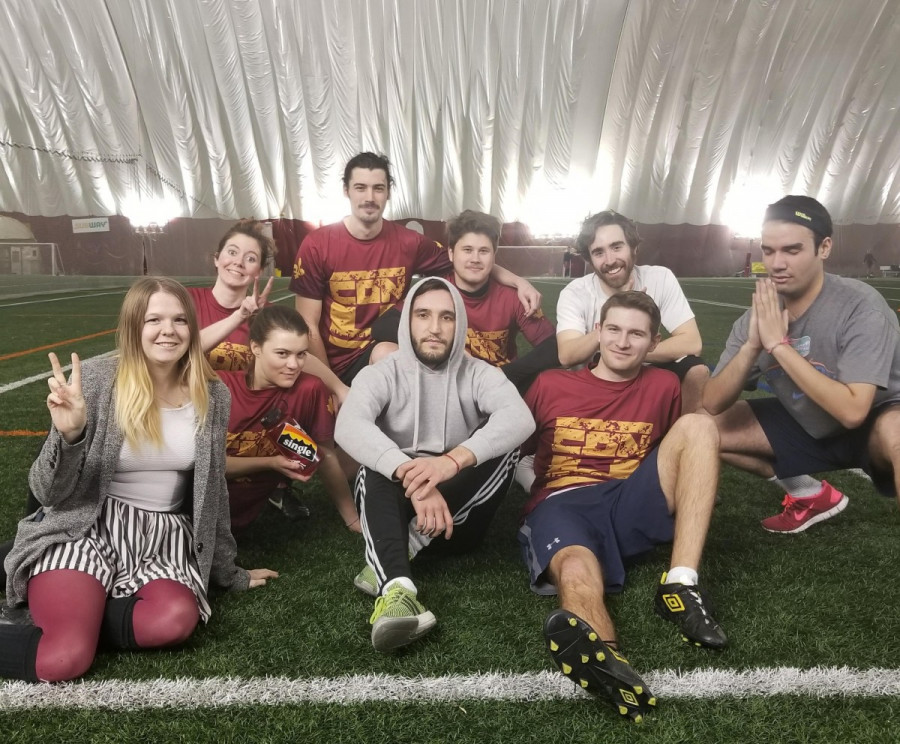Ultimate Frisbee is the Utopian Sport of the Future
Concordia’s Ultimate Team Wants You to Make Disks Fly
I recently met Concordia’s ultimate frisbee team in the dome on the Loyola campus during one of their practices, and ever since then I’m convinced that ultimate frisbee is the utopian sport of the future.
Like in football, players score by passing and catching the disk in the endzone. It’s a no contact sport, and once you catch the disk, you have to stop running and try to pass it to the next person on your team.
And while most sports look to a third party to referee the game, players in ultimate frisbee have no masters. They are self-governed—they call their own fouls, and only if they’re absolutely certain one has happened.
Yahriel Heffez has played on the team since 2015, and he gave me the inside on the game’s guiding philosophy, which they call the “spirit of the game.”
As he explains it, “The purpose is to make sure that everyone has fun all the time.”
“Everyone’s supposed to be playing to help others have fun, so we call our own fouls, and we have no referees,” he explained while his friends practiced behind us. “So to play in the spirit of the game means playing according to the rules, and to play in a way that if you do violate the rules, you assume responsibility for it.”
While most sports pride themselves on being hyper-competitive, people who play ultimate frisbee usually play the game with a sense of humour.
“It’s just a good vibe around the sport.” said Audrey Marquis, co-captain of their women’s team. “It’s super welcoming, and you don’t feel like a loner if you don’t know the sport.”
It all stems from ultimate frisbee’s history. The game started with casual throws in the park with a group of friends from Columbia High School in Maplewood, New Jersey, so having referees was out of the question. The first game was played in 1968 at the highschool, between the student council and the staff of the student newspaper.
“I just remember one time running for a pass and leaping up in the air and just feeling the Frisbee making it into my hand and feeling the perfect synchrony and the joy of the moment, and as I landed I said to myself, ‘This is the ultimate game. This is the ultimate game.’”
— Jared Kass, one of the inventors of ultimate, interviewed in 2003.
Since then, the game has continued to run on self-officiation, even at the highest level of competition.
Players here at Concordia value competition, especially when they play against other university teams during the fall tournament, but players of ultimate try to never let their pride override the joy of playing.
Being aggressive is taboo, and players are encouraged to be generous in the way they compliment each other.
As their captain Jordon Faries explained, “It’s not about the bragging rights, it’s about the passion.”
To top it off, both teams rank opposing players in “spirit points” at the end of each tournament game. Through direct democracy, players judge whether the team they played against were impartial when calling fouls, if they avoided contact, and if they were playing a fair game.
“You do sometimes encounter other teams that aren’t as nice, and it kind of puts the vibes down,” said Marquis. “It’s always fun at the end of the day, cause we end up laughing about it.”
If a team scores poorly in their spirit points, they can even be asked to leave the league, though Heffez says it’s extremely uncommon any team steps into that territory.
And since the game is a no contact sport, there’s no concussions—making the sport accessible and safer for people of all ages.
With news over the summer that the International Olympic Committee gave official recognition to the World Flying Disc Federation, the sport is now one step closer to being played on the world stage.
It’ll be hard for the game to compete with more established sports to get into the program, and we’re not there yet, but we should be. I’m convinced it’s the sport of the future, and as I always say, you either get with the future or go as it leaves you behind.
But there’s good news.
Because Concordia’s Ultimate Frisbee team isn’t accredited, anyone can join. Most people join through word of mouth, and if you’re interested just hit them up on their Facebook page. They play against other universities weekly, and you can practice with them at the sports dome at the Loyola campus.
“I really like that it’s a very accessible sport, all you need is a $10 disk and a field to play it,” said Faries. “It’s easy to start, it’s hard to master.”
Last fall, their team wasn’t able to get to the regional Canadian University Ultimate Championship tournament because they were lacking players. Though the team often opts for co-ed games, their women’s team still wants to grow so it can enter into more competitions.
That’s why they need YOU.




_600_375_90_s_c1.jpg)
4_600_375_90_s_c1.jpg)
1_600_375_90_s_c1.jpg)
_600_375_90_s_c1.jpg)